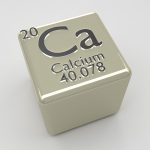 Calcium, the most important mineral for bones?
Calcium, the most important mineral for bones?
Well, actually no it isn’t. What about Magnesium, the forgotten mineral? There’s no denying that Calcium is important but in this modern age, we seem to be over consuming this alkaline metal. Calcium should be found mostly in the bones and teeth but I’m afraid it’s being found in all kinds of places where it shouldn’t be.
Our food is being fortified with Calcium?
How many adverts do you see with ‘fortified with Calcium’ or ‘Calcium rich for strong teeth and bones’. The fact is that Calcium (Ca) is a bit of a rogue. If it isn’t under control, it can run amok in your body, causing all sorts of ailments and problems.
Yes, you heard me, Ca can be a rogue, if not controlled. In fact in can be dangerous!
How often do you hear parents going on about getting enough Ca into their children. How many parents stress about the Ca intake their children must have. How many parents buy foods that they consider to be rich in Ca to make sure their children grow up with strong bones and healthy teeth. Has anybody mentioned Magnesium (Mg) at all?
Why are our foods being fortified?
Well just think about it. Ca is the star mineral supplement. The food manufacturers are just  large companies. What’s the most important consideration that a food company thinks about first? Profits! They know that you think that Ca is the bees knees and so they jump on the band wagon and produce all kinds of products with Ca because they know you will buy it, because you’re going to buy anything you think is good for you and your family.
large companies. What’s the most important consideration that a food company thinks about first? Profits! They know that you think that Ca is the bees knees and so they jump on the band wagon and produce all kinds of products with Ca because they know you will buy it, because you’re going to buy anything you think is good for you and your family.
You have been mis-informed!
You have been entirely mis-informed and mis-guided and I’m sorry to say that this myth that loads of Ca can be nothing but good for you, is put about by many health professionals. There have been many studies about the relationship between Ca and Mg. A new study, concentrating particularly on children’s health, shows that Mg in a childs diet is the key to producing strong bones and teeth. Researchers found that dietary Ca was not significant when associated with bone mineral content or bone density.
Mg regulates Ca
This study was presented to the Pediatric Academic Societies in Washington DC in 2013. It confirms that Mg regulates the amount of Ca in a child’s body and consigns it straight into the bones where it belongs. If Mg is not in sufficient quantities in the body, Ca ends up depositing into parts of the body where it does not belong like the kidneys, coronary arteries and cartilage.
So, what’s gone wrong?
One of the problems is that our medics are not trained to be aware of the benefits of vitamins and minerals. This is not their fault, their training does not deal with wellness and  naturopathy and much of it is under the control of big pharma who deal with sickness and the drugs that can be used to manage that sickness. You notice I say ‘manage’ not cure. Secondly, our soils are so depleted in natural vitamins and minerals due to agricultural practices, fertilizers and pesticides, that most of the population is now deficient in many nutrients, Mg being the one exceptionally important to our well-being.
naturopathy and much of it is under the control of big pharma who deal with sickness and the drugs that can be used to manage that sickness. You notice I say ‘manage’ not cure. Secondly, our soils are so depleted in natural vitamins and minerals due to agricultural practices, fertilizers and pesticides, that most of the population is now deficient in many nutrients, Mg being the one exceptionally important to our well-being.
What can be done?
For a start, if you or your children are taking Ca supplements while still eating dairy produce, milk and other normal foods, then don’t. If a medic has advised you to take Ca without taking Mg, I would question it. Do your own research. This is your body and your children’s welfare we’re talking about here.
Get genned up!
Get genned up and learn what your body needs to be healthy. If you approach your doctor about the benefits of Mg, don’t be surprised if you get a frosty reception or a blank look. We should all take a stand against taking drugs when an important nutrient will do the job as well and with no side effects.
Check out this site about the ailments you could succumb to if you don’t have enough Mg in your body. The ratio between Ca and Mg should be around 1:1. At present, it is estimated that the normal diet ratio is coming out between 5:1 and 10:1. Just do a quick  check of how much Ca you ingest in a day and then compare it to your Mg intake; you’ll be surprised. Ca is in many foods and the food manufacturers often fortify with Ca. How often to you see Mg being fortified? How often do you see Mg even being mentioned?!!
check of how much Ca you ingest in a day and then compare it to your Mg intake; you’ll be surprised. Ca is in many foods and the food manufacturers often fortify with Ca. How often to you see Mg being fortified? How often do you see Mg even being mentioned?!!
Women are more at risk!
Women are more at risk of being overloaded with Ca. Those that have been diagnosed with osteoporisis will no doubt have been told by their medic that they must increase their Ca intake. An NHS webside writes:
“You may not need or want to take medication to treat osteoporosis. However, you should ensure you’re maintaining sufficient levels of calcium and vitamin D. To achieve this, your healthcare team will ask you about your diet and may recommend making changes or taking supplements.”
Why are we being mis-informed?
This is a typical example of mis-information. They fail to inform the patient that in fact Vitamin D production will be hindered with a Mg deficiency which will further weaken bones. Also without sufficient Mg, Ca metabolism will be compromised which will lead to Ca migrating away from the bones and towards areas of the body it shouldn’t be, such as the kidneys! Osteoporosis sufferers, according to surveys, have low levels of Mg in their bodies.
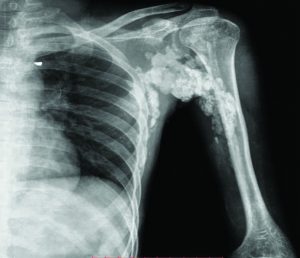 Dr Thomas Levy wrote in his book Death by Calcium “Recent scientific data provides an overwhelming case against calcium”. Osteoporotic bone has too little Ca in it, that’s true. But the rest of the body has too much Ca which settles in unwanted areas and soft tissue. The longer osteoporosis has been in the body, the greater the excess of Ca outside the bone. The image shows massive calcification in the upper arm. How did it get there?
Dr Thomas Levy wrote in his book Death by Calcium “Recent scientific data provides an overwhelming case against calcium”. Osteoporotic bone has too little Ca in it, that’s true. But the rest of the body has too much Ca which settles in unwanted areas and soft tissue. The longer osteoporosis has been in the body, the greater the excess of Ca outside the bone. The image shows massive calcification in the upper arm. How did it get there?
Mg has a massive impact on the quality of our bones.
- Mg regulates Ca transport.
- Mg activates an enzyme needed to form new bone.
- Mg is necessary to activate vitamin D to help Ca absorption.
- Mg stimulates calcitonin, a hormone which helps maintain bone structure.
- Mg ushers Ca out of soft tissue and blood into the bone where it belongs. This reduces the incidence of kidney stones and arthritis. Research has shown that the little known vitamin K2(MK7) along with Mg and vitamin D3 will actually help remove Ca from soft tissue and usher it to the bones where osteocalcin takes over to keep it there.
- Mg inhibits parathyroid hormone, preventing it from weakening bones.
- Moderate levels of Mg are vital for absorbing and metabolizing Ca.
And lastly…
Take a Mg supplement. Even without checking, you will surely be deficient. Mg is just not in our food anymore, to the degree it was a century ago. Stress is another Mg depleter. We are all under immense mental and bodily stress in this modern age and this will reduce our Mg levels.
We need Mg like we need water.
It is one of the most fundamental 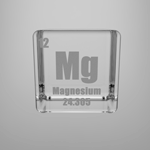 nutrients and electrolytes. Without it you will be unwell and could even suffer serious side effects, not least heart disease, stroke, atherosclerosis and diabetes. Many of the drugs we take for these conditions can deplete Mg further.
nutrients and electrolytes. Without it you will be unwell and could even suffer serious side effects, not least heart disease, stroke, atherosclerosis and diabetes. Many of the drugs we take for these conditions can deplete Mg further.
Which supplement to take?
Mg citrate is ideal if you require a gentle laxative effect and it can be taken orally in powder or tablet/capsule form. Many who are Mg deficient, suffer with constipation. The powder form allows you to adjust your doses very accurately to suit you. It is also very useful for child constipation as it is completely tasteless and can be put into drinks or soups etc..
If you don’t want a laxative effect then go for Mg chloride (MgCl2). This compound is totally bio-available and is by far the best supplement IMHO. (ReMag produced by Dr Carolyn Dean is MgCl2). Ionic Mg is also MgCl2. It can be used topically too. It is easily absorbed through the skin and those with a sensitive stomach will appreciate this form of Mg supplement. For those who don’t like the taste, it can be easily disguised with a drop of cordial.
Mg oxide is the cheapest form of supplement and needs to be avoided. It will generally be inside inexpensive multivits and other low-priced supplements. It is poorly absorbed so you need a hefty dose most of which will go straight through you.
Start searching for the best supplement for you and notice how different you feel after taking it for just a day or two. You will have more energy, you will sleep better, your digestion will improve, back aches, muscle spasms and cramps will diminish. The benefits are endless. By the way, an adult needs between 300 and 400mg of elemental Mg per day,  minimum. I take between 500mg and 600mg per day of Mg Chloride, depending on what I’ve eaten. All my previous ailments have gone, including digestion problems, eye twitches, back ache, painful muscle spasms, sciatica, brain fog, anxiety, depression, stress, anger, irritability, sound familiar? I still get insomnia sometimes but that is always after a day of not taking my quota of Mg.
minimum. I take between 500mg and 600mg per day of Mg Chloride, depending on what I’ve eaten. All my previous ailments have gone, including digestion problems, eye twitches, back ache, painful muscle spasms, sciatica, brain fog, anxiety, depression, stress, anger, irritability, sound familiar? I still get insomnia sometimes but that is always after a day of not taking my quota of Mg.
Spread the word!
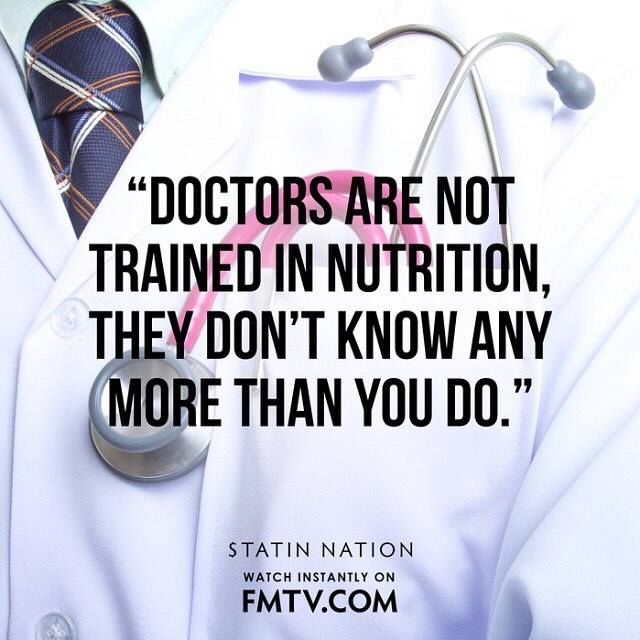
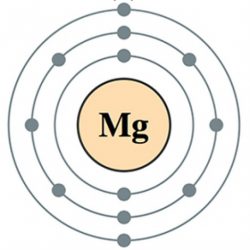
Thankyou for your great article. I think we do tend to forget about the importance of magnesium. I never new that magnesium can help with cramps and spasms. I get a lot of these in my legs mainly at night when im trying to sleep so I will defiantly give these tablets a try. Is it important to get organic ? Thanks again Joanne
Hi Joanne, yes it’s great if you can get organic foods when you can, although this is sometimes more difficult for those that are on a low income. Magnesium is a nutrient that is necessary for the activation of hundreds of enzymes up to 800 now known. It is the relaxation mineral an antagonist of calcium. Calcium is the mineral of tension. With spasms and cramps, calcium will be in abundance and magnesium depleted. Remember your most important muscle your heart. Magnesium deficiency can cause heart events and a good indication of magnesium depletion can be arrhythmias and palpitations. Make sure you take good quality supplements such as Mg Chloride such as ReMag and Mg Citrate which comes in powder form making it easy to dose for your needs (great for kids). It is especially good for constipation which is another symptoms of deficiency. Good health to you. Ches
I totally agree with you saying we over consume Calcium. Actually recent studies show that too much calcium is not even good for health… Too much of anything isn’t good really lol.
I for instance stopped drinking milk and replaced it with other sources of calcium and started taking marine magnesium. I sleep much better now and feel healthier.
I was wondering if there are different types of magnesium? For instance I’m taking marine magnesium but are there other types and which one is the healthiest and more recommended?
Thanks!
Sarah
Hi Sarah and thanks for your input. If you go to Best Magnesium Supplements To Take this will give all the information about the various Mg supplements. IMHO Mg Chloride (MgCl2) is the best there is and the most bioavailable. I take 600mg per day of MgCl2 solution which I put in 1 litre of water and drink gradually throughout the day. I also make sure I eat plenty of food with Mg in. It’s interesting to note that just 1 pint of milk is enough Ca for the day, without anything else you’re likely to consume without even knowing it, such as Ca fortified juices and cereals. If your Mg is working for you then great but if you want higher absorption without a laxative effect then I do recommend MgCl2. Ches
I’ve read that magnesium is important for absorbing Calcium and if I remember correctly it helps prevent cavities too (along with sufficient amounts of vitamin D). But I didn’t know that Calcium could be dangerous. I never wondered if I was getting too much Calcium since I figured I wouldn’t be able to overdose on it unless I was taking supplements. Is it possible for someone to be intaking too much calcium from their diet without taking supplements?
Hi Martina, Yes it is possible to take in too much Calcium by diet especially if you’re on a lot of milk, cheese, yoghurt, fortified orange juice, fortified cereals etc.. The trick is not so much the Ca excess, it’s the balance of Ca:Mg. If you take in too much Ca, you will likely be Mg deficient by default. You should aim for a 1:1 ratio Ca:Mg which is very difficult as Mg is not found in our foods as much as Ca is, mainly because of agricultural practices in this modern age ie., pesticides, fertilizers, fungicides and fortification of Ca by the food manufacturers (without balancing with Mg). One pint of milk alone will give you all the Ca you need for the day. Many of the foods that do have Mg in them also have Ca in them. A prime example is almonds, which have nigh on equal amounts of Ca and Mg. It is so easy to overload on Ca but very difficult to get enough Mg. That’s why a Mg supplement is the best course of action. Mg is necessary to convert dietary Vitamin D to make efficient use of Ca in bone formation. Thanks for your comment and input. Ches
Hi Chessie,
I love the way you have dedicated your whole website to sharing the benefits of magnesium… as you say – the forgotten mineral.
This is vital information as you already realise. You wrote it in a very easy to read fashion to which is fabulous.
I appreciate your work and time.
Marilyn
Thank you for your kind comments Marilyn. Ches
Dear Ches,
Thank you for all your information, I have been taking Magnesium Regularly now for 6 months. The main things that I have noticed are improved energy levels and no more trouble with sleeping which used to be a real problem.
I also used to have lower back pain which has totally disappeared and also my teeth never ache like they used to.
I am that pleased that I have told a lot of my friends who are now also taking magnesium and reaping the benefits.
Thanks again Sam
Hi there Sam, Thanks so much for reading the post and taking the time to send a comment. It is so gratifying to know that the word is gradually spreading and that people are benefitting from taking this amazing mineral. Have I got your permission to put your story on our ‘magnesium miracles’ page? Best wishes to you, Ches
Hi! Very useful post! I love the part in which you confirm my beliefs about conventional medicine and pharmacy. You really explained it all in very understandable manner. Since you are doing I believe a lot of research in your niche, I think you might help me with question that is swirling in my mind for some time. I found some not that good informations about effect of milk on human body. Do you have some knowledge about this?
Hi Branka and thanks for reading the post. There is a concensus of opinion that milk is for babies only, as in animals, who once weaned from their mother, don’t ever go back to milk in the wild. That being said, milk has a lot of Calcium (Ca) and often we have too much Ca in our bodies compared to Mg. The ratio of Mg to Ca should be around 1:1 but this is difficult to achieve with the Ca rich foods that we tend to consume. Food manufacturers also fortify a lot of our food with Ca, exacerbating the problem. Ca without Mg can be harmful to the extent of causing serious problems like heart disease and stroke. If you’re Mg replete and your Mg and Ca levels are equal, this wouldn’t happen, but odds are you WILL be deficient in Mg, so Ca does not do the job it’s supposed to, because it hasn’t got its partner Mg to keep it under control. If you are replete in Mg, then milk and other Ca rich foods are fine to consume in my mind. Do a check on how much Ca you consume in a day and then compare it to how much Mg you have, you’ll be surprised! Best of health to you, Ches
I have much more Ca for sure. I sit all day in front of my computer and I drink at least 5 nes coffees with milk 🙂 lovely habit.. thank you so much for answer, I see you have posts about food rich with Mg and some other, I will check them out! Thank you!
Thanks Branka, I am doing content at this present time on foods and different supplements of Mg. They should be edited and up on site within a day or two. Meanwhile, check my other posts, there’s some really good information for specific diseases. My ‘diseases’ page will also give you an insight to just how much we need this miracle mineral and how many diseases and symptoms are affected. Good health to you, Ches
Your article was very informational. I enjoyed reading it. You went into great detail to explain the benefits of mg and what could happen if it is low or missing in your body. We all need an excellent source to remind us how important it is to keep ourselves in great shape and health. You certainly implemented your advice with many examples. My eyes have been opened to the importance of mg.
Thank you for sharing.
Marilyn
Thank you Maryilyn for reading the post and I’m pleased you found it informative. I hope you keep an eye on your Mg levels by noting any symptoms you may have. Taking a Mg supplement is always a good idea to stop those symptoms from occuring in the first place. By the way, if you do take Calcium in any form, you must keep your Mg up to match or the Calcium will not be beneficial, in fact, it could be the opposite! Good luck and good health, Ches
Interesting post I learned a lot about a topic I previously new nothing about. Very well done!
Thanks for reading the post Mr. Mystery. Hopefully you’ll find benefit with taking a supplement of Magnesium to keep you in tip top shape! By the way, nearly all athletes use it to stop lactic acid build-up! Ches
I’ve always had a great interest on foods and supplements to see whats best for the body. My wife and I both around 60 do not use drugs or need any as we see about eating as healthy as we can.
I find when the drug companies think they discover something they single the substance out and mass produce it. There products do not cure but mask the issue and cause side effects most the time because they lack the other supporting minerals and vitamins.
I had always learned the Mg was 1/3 to Ca in order for your body to absorb the Ca properly. Your 1 to 1 is something I shall definitely look into.
Great post
Hi Travis and thanks for reading the article. As we get older we tend not to absorb minerals and vitamins as efficiently as when we were young. This is why Mg supplementation is so important as we age. I’m pleased to hear you are not on any prescription drugs and that you are well, probably because of that fact. I agree with you totally that big pharma do not cure, only manage and mask the symptoms of illness, meanwhile adding more complications by way of side effects. The 1:3 or even 1:2 ratio actually came about in the last century when an eminant doctor spoke of the ratio and it was misunderstood and taken as the standard. It is known that the paleolithic diet that has evolved with our bodies was actually 1:1. Keep well. Ches
Great article on the importance of magnesium.
Just before I came across it I was thinking that I was out of my usual supplement and have been for a couple of weeks. In the last 2 days I’ve noticed 2 things; nighttime muscle spasm in my foot and calves, that could also be from some extra hill training I’ve been doing but I wonder…and also I seem to have a flare up of dermatitis which I’ve had a few times, or I am having an allergic reaction. Anyway, I can’t help but think these things may be related to the lack of the vitamin supplement so rather than take anything (particularly for this horrible itch) I think I need to restock the vitamins. What would you suggest?
Hi Alison and thanks for reading the article. You can actually use a solution of Mg chloride for any skin complaints, also soaking in a bath of epsom salts (Mg sulfate) or even just soaking your feet, is also an ideal way to absorb Mg through the skin. As far as vitamins and other nutrients, if you are worried that you may be deficient, try consulting a Naturopath rather than a medic. Naturopaths deal in natural solutions to health problems and if you are deficient, they will pinpoint your deficiency and advise you. As far as Mg deficiency is concerned, the majority of the population are deficient and it would definately help your muscle spasms. Don’t take milk or dairy products before bed unless you are supplementing efficiently with Mg. Mg is a natural muscle relaxant, Ca is the opposite. Ca causes muscles to contract and Mg causes muscles to relax. You need both elements in equal quantities to work your muscles properly and that includes the heart! The fact that your muscles are contracting and not releasing into relaxation is a good indication of Mg deficiency. Keep well. Ches